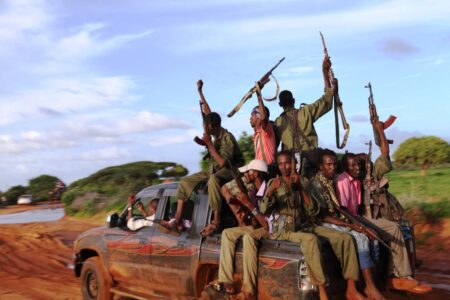
Kenya and Democratic Republic of the Congo sign defense pact to cooperate against Islamic State
On April 21, Kenya and the Democratic Republic of the Congo (DRC) signed agreements on security and defense amid growing threats from Islamic State in Central African Province (ISCAP), which is active in the eastern DRC.
The security and defense pacts provide mechanisms for cooperation between the two countries in counter-terrorism, immigration, arms smuggling, cyber security, and customs and border control.
Presidents Uhuru Kenyatta of Kenya and Felix Tshisekendi of the DRC signed the agreements alongside other ministers of the economic and maritime transport sectors (The Star, April 21). Nevertheless, the key focus was ISCAP, which the U.S. designated as a foreign terrorist organization in March (Sabcnews.com, March 11, 2021).
ISCAP is rooted in the Allied Democratic Forces (ADF), which is an Islamist militant group originally from Uganda that has carried out numerous armed attacks, kidnappings, and killings in North Kivu, South Kivu and Ituri regions of the DRC. Islamic State (IS) has also claimed responsibility, in ISCAP’s name, for attacks attributed to ADF because ISCAP and ADF overlap, with the latter having formally evolved into the former in 2019.
Among ISCAP/ADF’s most notable attacks was in March 2021, when it raided the village of Bulongo in eastern DRC, killing at least 15 people (Africanews, March 15).
In May 2020, IS further claimed two separate attacks blamed on ISCAP/ADF in Ituri and Beni, which left more than ten dead. In the attacks, seven bodies were found in Beni, near the border with Uganda, while another four were found in Ituri. Earlier, in April 2019, IS claimed responsibility for attacks on Kamago and Bovata villages near the town of Beni (Africanews, May 15, 2020).
Kenya, meanwhile, has been backing efforts to end lingering armed conflicts in eastern DRC from well before ISCAP’s announcement as a group that succeeded the ADF in 2019. In 2013, for example, Kenya hosted Congolese parties in signing a peace agreement with the March 23 (”M23”) Movement, which is also known as the Congolese Revolutionary Army (The East African, April 22).
The rebel group took up arms against the government in 2012 alleging that the DRC government marginalized ethnic Tutsi and failed to honor earlier peace accords, but was unrelated to ISCAP/ADF. Although M23 allegedly dissolved after the Nairobi agreement, its ex-combatants have been accused of carrying out attacks in North Kivu in recent years (Africanews, February 12, 2017).
In April, Kenya escalated its presence in the DRC by sending additional troops to the country. This included an elite force of 200 soldiers deployed in the eastern part of the country through United Nations Security Council arrangements.
Previously, only a small number of individual Kenyan military officers and military observers had been deployed for The United Nations Organization Stabilization Mission in the Democratic Republic of the Congo (MUNOSCO) under the United Nations Security Council Resolution 2556 (2020) (The Star, April 28). MONUSCO’s Quick Reaction Force was expected to enable peacekeeping troops to patrol remote villages and deter further violence in the eastern DRC (Nation, May 1).
Kenya started contributing to peacekeeping missions in 1979, and an estimated 55,000 soldiers have served in missions across the world (The Standard, April 22, 2021). However, the forthcoming deployment to the DRC will increase the numbers of Kenyan forces in the country from 200 troops to 1,600 soldiers and intelligence officers.
They will replace a South African contingent that was based in the DRC and will operate in North Kivu, South Kivu and Ituri regions. The Kenyan soldiers and intelligence officers in the DRC will further serve for a period ranging from four months to four years depending on whether they are under the Kenya–DRC security agreement or MONUSCO (Nation, May 1).
Many of the ISCAP/ADF fighters originate from East African countries, including Kenya, Uganda, and Tanzania. Moreover, since populations in eastern DRC speak Swahili as one of their main dialects and use Swahili as a common language, it is easier for ISCAP to recruit and spread in country and throughout East Africa (Strategic Intelligence, April 23). At the same time, this also means Kenyan forces are well-placed to gather intelligence on ISCAP/ADC compared to non-Kiswahili-speaking peacekeepers from countries outside East Africa.
ISCAP/ADF has also received funding from a network in Kenya. In 2018, the Kenyan police detained Waleed Ahmed Zein and Halima Adan Ali for allegedly moving funds for IS (Kenyas.co.ke, July 6, 2018).
These two Kenyans ran an intricate financial facilitation network for IS, which spanned across Europe, the Middle East, and East Africa. Halima, working closely with Zein, had allegedly received large amounts of money from different parts of the world through hawala, a Somali financial payment medium, and forwarded funds to IS fighters in Syria, Libya, and the DRC (KBC, July 5, 2018).
Source: James Town





